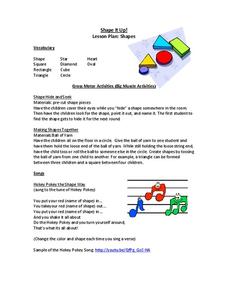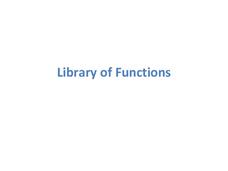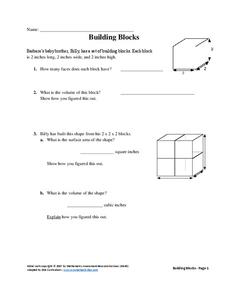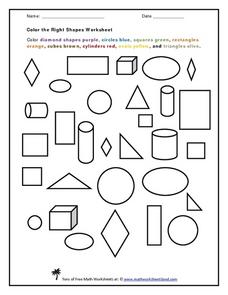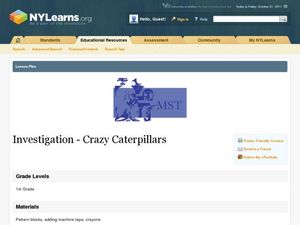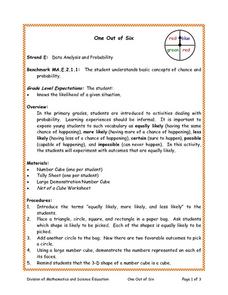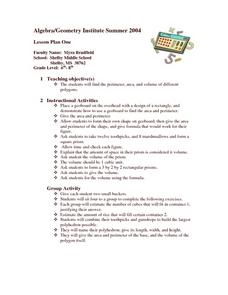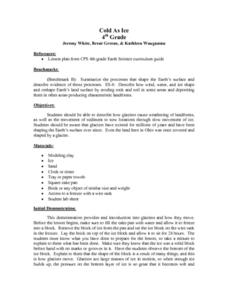Curated OER
Solving Square Root and Other Radical Equations
In this Algebra II worksheet, 11th graders solve equations involving radical equations. The worksheet provides an explanation and worked examples. The two page worksheet contains three problems. Solutions are not...
EngageNY
Solving Equations with Radicals
Show learners how to develop a procedure for solving equations using radicals with the fifth instructional activity of the 25-part module that challenges learners to use properties to solve multi-step quadratic and cubic equations....
Del Mar College
Translating Verbal Expressions
Help scholars translate verbal expressions into numerical expressions. The two-page document is comprised of descriptions and examples that showcase terms and phrases related to addition, subtraction, multiplication, division,...
Mathed Up!
Factors, Multiples, and Primes
Reinforce the concept of factors, multiples, and prime numbers with a 16-problem practice instructional activity. Eight pages offer a variety of problem solving opportunities with clear objectives and tips for...
Early Childhood Education
Shape It Up!
The best way to understand shapes is to make them. Young geometers explore basic shapes through a variety of gross motor and fine motor activities. Shape sorting, singing songs about shapes, and eating shape snacks are just a few of the...
Houghton Mifflin Harcourt
Unit 3 Math Vocabulary Cards (Grade 1)
Reinforce math vocabulary with a set of flashcards. Each card showcases a boldly typed word or a picture representation with labels. The topics are geometry related and include terms such as cones, faces, pyramids, sides, and...
Houghton Mifflin Harcourt
Unit 6 Math Vocabulary Cards (Grade 5)
Acute angles, nets, and vertices are only a few terms that a set of flash cards includes. Among the 108 cards, two types are available; word cards printed in bold-faced lettering, and corresponding definition cards equipped with an...
University of North Texas
Library of Functions
Join the family picnic and see how all the functions come together in a PowerPoint that highlights their main features. As it includes topics such as domain, range, and intercepts, the slides are a great guide to promote class...
CCSS Math Activities
Building Blocks
Math is a lot like building blocks—it requires a solid foundation. A short performance task has pupils consider the volume of a cubic block. It then asks mathematicians to find the surface area and volume of a prism made from stacking...
Curated OER
Volume
In this finding volume practice worksheet, learners sharpen their problem solving skills as they solve six story problems.
Key Curriculum Press
Lesson 10.2 Volume of Prisms and Cylinders
Tenth graders investigate volume in class and in the real world. They explore volume of cylinders and prisms as it relates to different subjects. Pupils also investigate how important volume is in different career field.
PBS
Surface Area and Volume
You and your class will like this lesson on using visual models to relate the volume and surface area of solid shapes. Learners construct three-dimensional forms using nets. They calculate the surface area and volume for each and then...
Curated OER
Volume Worksheet I
In this volume worksheet, students recognize three-dimensional figures, identify the proper volume formula, and then solve the equation by inserting information from a diagram into the formula. Students solve six equations.
Curated OER
Steps to Factor a Polynomial
Learners explore the concept of factoring polynomials. In this factoring polynomials worksheet, students factor using a GCF, by grouping, a difference of two squares, two cubes, etc.
Curated OER
Color the Right Shapes
I remember doing this activity when I was little. Learners color each shape the color indicated at the top of the page. Squares are blue, cubes are red, circles are green and so on. There are 30 shapes to identify and color.
Curated OER
How much room?
Students examine the amount of usable space that exists in their classroom using square meters and square centimeters. They apply the information to predict the ideal size of a classroom.
Curated OER
Investigation: Crazy Caterpillars
First graders explore biology patterns by creating a model insect. In this patterns lesson, 1st graders utilize snap cubes and pattern blocks to recreate their own version of a centipede or caterpillar. Students create their caterpillars...
Curated OER
Surface Area
In this geometry instructional activity, 10th graders define surface area, net and lateral face. They calculate the surface areas of cones, prisms and cubes. There are 9 surface area questions.
Curated OER
One Out of Six
Students investigate basic concepts of chance and probability. They make a number cube to predict which number might be rolled the most often out of 20 consecutive rolls and tally the results. Number cube template included.
Curated OER
Surface Area practice 17.4
In this finding the surface area worksheet, students determine the surface areas of solid figures, complete the areas of a face and surface area of a cube in a table, and answer word problems. Students answer fourteen questions.
Curated OER
Investigation - Dressing the Baby
Second graders complete an inquiry activity to determine how many combinations they can make using cut-outs of tops and bottoms. In this combinations and organized lists table, 2nd graders work with three colored cut-outs of tops and...
Curated OER
Lesson One: Perimeter, Area, Volume
Students explore perimeter, area and volume. Using geoboards, toothpicks, and marshmallows, students create specific shapes. They are directed to use formulas to find the volume, area, and perimeter of the created shapes. In groups,...
Curated OER
Jelly Beans for Sale
Students connect literature (story Jelly Beans for Sale by Bruce McMillan) to math concepts. In these estimating and money lessons, students work with jelly beans, unifix cubes, pennies, nickels, dimes, and quarters, to estimate and make...
Curated OER
Cold As Ice
Fourth graders investigate how glaciers cause the weathering of landforms. They observe a brick that has been placed on a frozen slab of ice, and discuss the results, comparing them to the movements of a glacier. In small groups, they...






